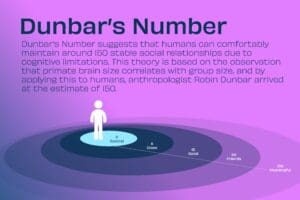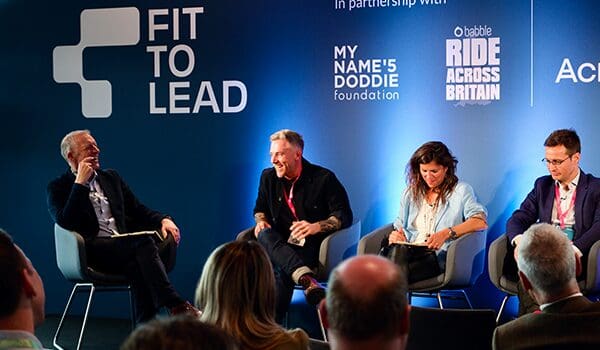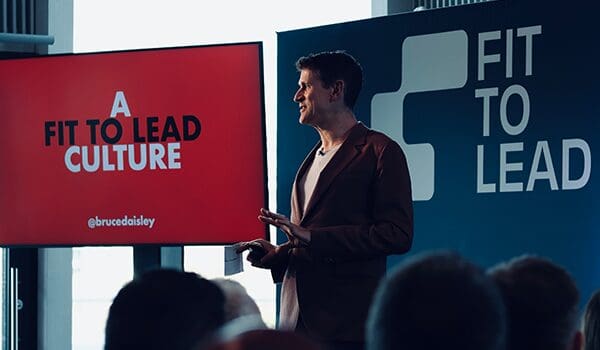Top business and tech leaders convened at London’s National Theatre on the 16 th of April for Babble’s Fit to Lead Executive Lunch and Forum. ‘The Corporate Philosopher’, Roger Steare began the second half of the event with his presentation Ethics in the Age of God-Like Technology which shed invaluable insights into becoming an ethically-fit leader.
-
What This Blog Covers:
- AI Ethics: Beyond the Boardroom
- A Bit About Roger
- What is God-Like Technology?
- AI: Promise and Peril
- From Code to Conscience: Ethical Leadership
- Human Connection: The Ethical Compass
AI Ethics: Beyond the Boardroom
We often equate ethical businesses with the decisions made in the boardroom. But the reality is, no matter what high-level strategy leadership develops around ethics, the business’ level of ethics is determined by the countless individuals on the frontlines of the organisation. Their everyday decisions – which are oftentimes overlooked by leadership – are where ethical conduct truly lives or dies.
This is why ethics is more important now than ever: as more organisations use AI IT solutions for businesses in their everyday tasks and decision-making, business leaders need to ensure that this technology is being used correctly. This goes beyond using AI responsibly, but rather speaks to the individual’s moral compass and how that translates to their role in the business. So, while Microsoft for example, has incredible AI technology, it’s important to deploy it in a way that is consistent with the organisation’s ethics.
A Bit About Roger
 This is where ‘The Corporate Philosopher’, Roger Steare comes in: he has deep insight into creating the perfect balance between ethics and optimising business operations. With over 20 years of experience in designing and delivering ethical leadership programmes around the world for multinationals and government agencies, Roger was the perfect speaker to unpack the third Fit to Lead pillar: Ethical Fitness. He is the author of Ethicability and the co-designer of the Moral DNA Ethical Diagnostic Tool.
This is where ‘The Corporate Philosopher’, Roger Steare comes in: he has deep insight into creating the perfect balance between ethics and optimising business operations. With over 20 years of experience in designing and delivering ethical leadership programmes around the world for multinationals and government agencies, Roger was the perfect speaker to unpack the third Fit to Lead pillar: Ethical Fitness. He is the author of Ethicability and the co-designer of the Moral DNA Ethical Diagnostic Tool.
Roger has been described as, ‘A lighthouse in thick fog in the middle of a zombie apocalypse’, as he is usually brought in as a troubleshooter when organisations might encounter a particularly challenging ethical dilemma. In most cases, this happens in the post-mortem phase, but his Ethics in the Age of God-Like Technology presentation is aimed at helping business leaders avoid catastrophe by providing proactive measures to become ethically fit.
What is God-Like Technology?
One simply needs to go back 100 years to understand why the technology we use throughout our waking moments is described as “God-like”. Take your smart phone for example, you may see it as a means to an end – a device to help you stay in contact with loved ones or send your emails – but it’s so much more than that. Your phone is a supercomputer that doubles as a time machine: it gives you access to all the information in the world while transcending space and time.
AI: Promise and Peril
AI is the fastest-growing technology there is and has quickly become an integral part of most of our lives. From healthcare to finance and all industries in between, AI is being used to analyse vast amounts of data, automate tasks, and make predictions with increasing accuracy. Arguably sitting at the top of the tech essentials list, this expansion is driven by advancements in machine learning and the availability of powerful computing resources, leading to new possibilities and challenges across society.
“It is a force for good, but it’s just like the knife. You can use it to help yourself eat and prepare a meal. You can use it to stick someone in the back.” – Roger Steare
Many-Shot Jailbreaking
Many-shot jailbreaking is a technique that exploits the ability of Large Language Models (LLMs) to process extensive amounts of text to generate harmful outputs in response to potentially dangerous prompts. In other words, firing lots of questions and prompts wears down the AI. This ultimately elicits a wide variety of undesired behaviours, such as insulting users and giving instructions to build weapons. From this, we see the morality and human intelligence AI lacks.
Deepfake
A deepfake is a manipulated video where someone’s appearance has been digitally altered to impersonate another person, which is often used to deceive, manipulate or harm. In Roger’s opinion, it is unlikely that AI deception and misinformation will be as sophisticated as some fear. But that doesn’t mean to say they will be any less effective, because simple plans work. He mentioned a research team that tracks government-linked threat groups from Russia, Iran, China, and other nations around the world. The result is that AI is a weapon of mass deception as well as mass destruction. However, it’s not feeding on itself. It’s feeding on what we’ve put out there. The LLMs are a mirror to us.
Tip: be mindful when interacting with free chatbots. After exhausting the web, cyber criminals are finding new ways to gain access to more data – including yours.
NVIDIA Launching Generative AI Microservices
NVIDIA is launching GenAI microservices, which sets the stage for a seismic shift in healthcare. The purpose is to allow precision diagnostics by programming the AI solution to read thousands of mammograms a day non-stop. Then they flag what they deem as a positive for the oncologist to examine further. While this revolutionises the healthcare industry and saves an immeasurable amount of time, they have been getting too many false positives. Once again, this illustrates the fact that AI is not as intelligent as we think it is.
From Code to Conscience: Ethical Leadership
Ethics comes into play when we start to think about how this technology is used. While AI can be built badly and it can malfunction as a result of improper coding, the technology in itself is not good or bad – it’s the people behind it. With technology that can replicate human behaviour and carry out various tasks and decisions, it’s easy to blame technology when things go wrong. But who created that technology in the first place?
Unlike the technology we build, we have emotions that either help or hinder us when making critical decisions. Despite the depictions seen in movies like Her and Ex , this human quality cannot be replicated in technology, yet we have given it some level of personhood in the workplace. Think about it:
We have tools and programmes that have the ability to enter into agreements, can sue and be sued, can hire you and can fire you – all despite not having a soul or conscience. You just have to hope that the people running it do have a soul and a conscience.
“We have Paleolithic emotions, medieval institutions and God-like technology.” – E.O. Wilson
Linking this back to leadership, Roger noted that despite the West’s general emphasis on democracy, companies are essentially medieval institutions that are not democratic. This is seen in the fact that business leaders are not elected by their colleagues. When leaders are elected, they become responsible for the wellbeing of their people. However, when they aren’t – as seen in medieval institutions – they can act in the best interests of the business and not necessarily the organisation.
“The corporation can get in the way of you as a leader exercising ethical fitness. But you have an opportunity despite that design to get over it and when you’re leading at your ethical best, you are actually solving that particular problem.” – Roger Steare
Democracy in the Workplace: A People-First Approach
When unpacking what ethical leadership looks like it’s best to start with the effect the leader has on their people. These leaders inspire their team, listen to them and seek their advice. While these leaders aren’t elected, democracy still exists in an organisation but only happens twice: when you sign the contract and when you sign your resignation letter.
In Bruce Daisley’s Resilience – The Myths of Inner Strength keynote– which he presented at the beginning of the Fit to Lead event – he emphasised the importance of friendship in the workplace to boost engagement and job satisfaction. Picking up on that, Roger noted that seeing work as a community of friendships is crucial. He then took a closer look at what exactly makes us happy – and it came as no surprise that people were at the top of the list.
Human Connection: The Ethical Compass
According to the Harvard Study of Adult Development (HSAD) (which is the longest-running longitudinal study of adult life), warm relationships scored the highest – above wealth and health – when the participants were asked what made them happy and gave them a sense of purpose.

“Ethical fitness is not just about having a moral compass, it’s about thinking about where you want to go with that compass pointing you in the right direction. It’s about the way we think, debate, and decide together what’s right.” – Roger Steare
The buzzword is togetherness, as we all exist in relation to each other. In making the thousands of choices you make in a day, you will oftentimes question whether or not you’re doing the right thing. When the answer is not so clear, you will most likely seek the counsel of someone you trust to help you navigate this difficult decision. Our warm relationships help us decide what’s right. The people we trust will tell us the truths we need to hear, but with love and compassion.
Navigating the Ethical Frontier: A Call to Leadership
In an age of God-like technology and complex ethical dilemmas, ethical leadership is more crucial than ever. As AI continues to provide optimum business tech support, and transform industries and societies, having the right moral compass becomes paramount for those who use it. Roger Steare’s insights underscore the importance of human connection, empathy, and ethical consciousness in navigating this uncharted territory. By fostering a culture of trust, transparency, and accountability, leaders can harness the power of AI for good while mitigating its potential risks.
Ultimately, ethical leadership is not just about making the right decisions, but about inspiring others to do the same. Find out how to do so in our next blog.

Never miss an article again
Subscribe to our blog updates and get the latest articles delivered right into your inbox.
Subscribe by email
You May Also Like
These Related Stories
%20(1).png)
What is Roger Steare’s MoralDNA Framework?

Lessons Learned from Babble’s Fit to Lead Executive Forum



